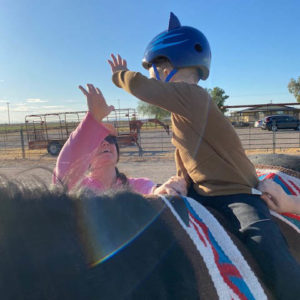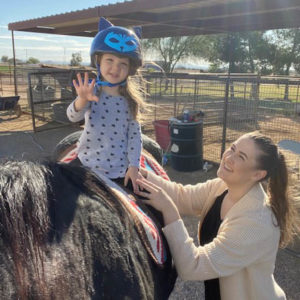We Provide Equine Therapy
Who are we?
Healing Saddles is a 501(c)(3) non-profit organization dedicated to making an impact on individuals’ lives who have physical, developmental, and emotional disabilities. We provide equine therapy to motivate every individual. We strive to enhance the lives of those we serve. We focus on using the connections of animals, therapists, and volunteers to benefit the lives of children, youth, and first responders. Healing Saddles is passionate about making an impact on others and we want to be apart of something bigger than itself!

How can you help?
Our non-profit can only continue to help those in our community with your help. We are always looking for volunteers to assist caregivers. We also accept donations. Please use the “Donate Now” button. If nothing else, we would love for you to share our website and mission on your social media.

Volunteer
If you are interested in volunteering for Healing Saddles, contact Monica Tapia or Jody Tapia. We will schedule you for an orientation and training. Due to the COVID-19 Pandemic, we do enforce certain requirements.

Donate
We rely on donations to operate our equine therapy non-profit organization, enhancing the lives of those we serve.
Contact Us
Monica & Jody Tapia
Email: healingsaddles@gmail.com
Website: healingsaddles.org
Property Address: 26514 N Desert Sky, Florence, AZ 85132
Mailing Address: 5571 E Dionysus, Florence, AZ 85132
What is equine therapy?
Equine therapy or equine-assisted therapy (EAT) encompasses a range of treatments that involve activities with horses and other equines to promote human physical and mental health. The use of EAT has roots in antiquity, and EAT applies to physical health issues in modern form dates to the 1960s. Modern use of horses for mental health treatment dates to the 1990s. Systematic review of studies of EAT as applied to physical health date only to about 2007, and a lack of common terminology and standardization has caused problems with meta-analysis. Due to a lack of high-quality studies assessing the efficacy of equine-assisted therapies for mental health treatment, concerns have been raised that these therapies should not replace or divert resources from other evidence-based mental health therapies. – Wikipedia